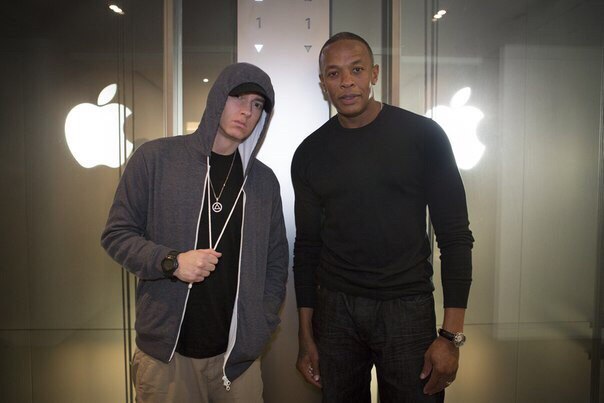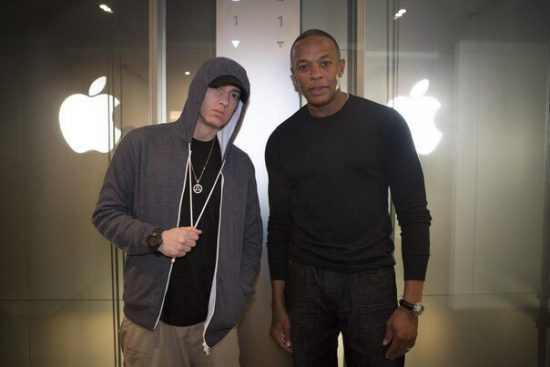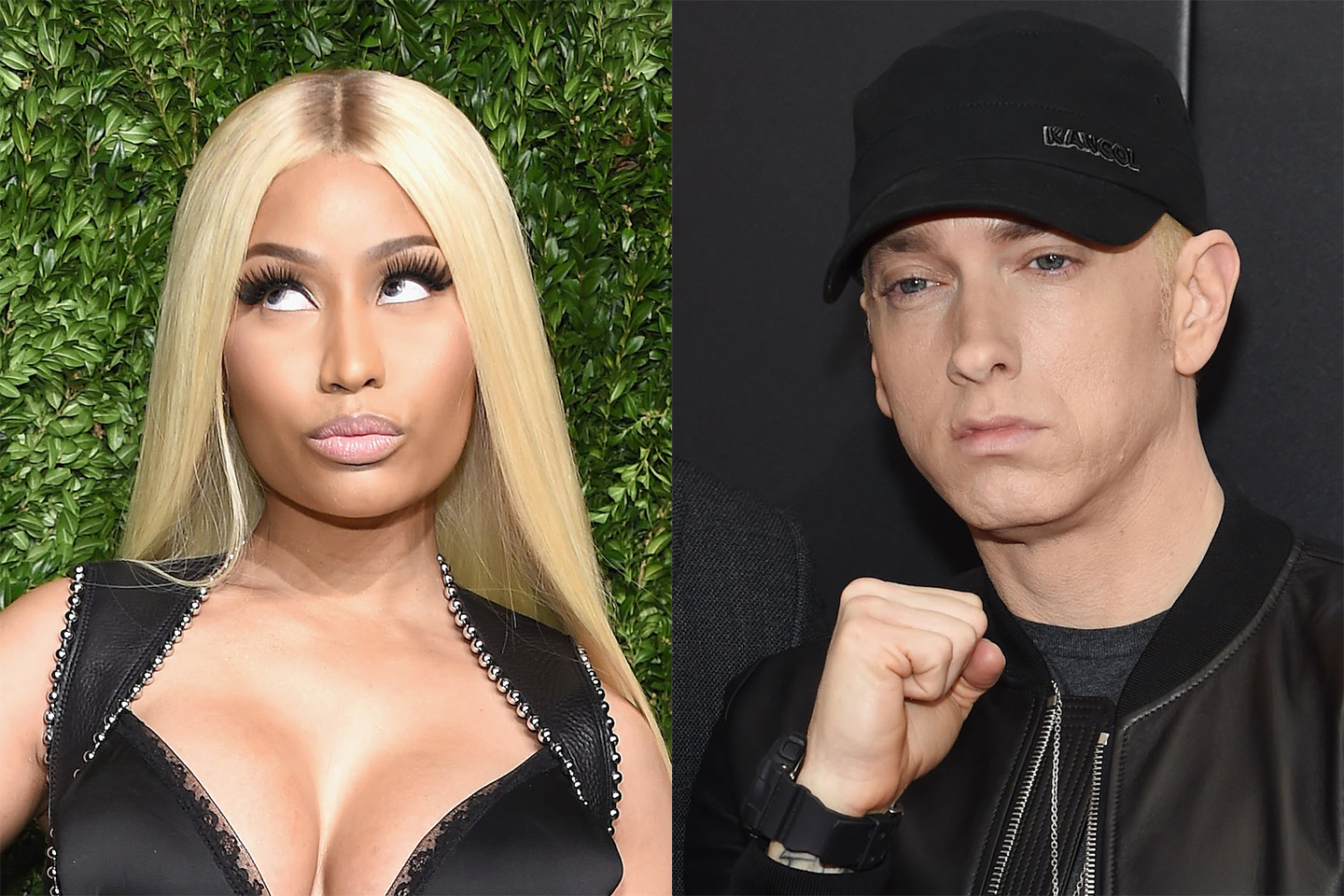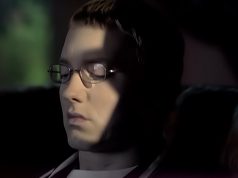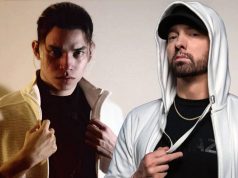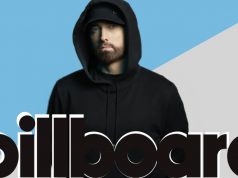Fifteen years after Eminem starred in 8 Mile, the former battler-turned-global superstar is producing Bodied, a Joseph Kahn-directed film that was written by another celebrated battle MC — Alex “Kid Twist” Larsen.
The movie, which explores free speech through the a capella battle rap scene, just premiered to rave reviews at the Toronto International Film Festival in Larsen’s hometown and is now being shopped around for distribution, promising a soundtrack with new material from Em and Dr. Dre.
This is all quite momentous for a kid who grew up idolizing Slim Shady while dreaming of being a writer. “It’s really intense for me,” Larsen tells Billboard. “I’ve always viewed battling as a hobby. When I started, it wasn’t a viable career. Being a writer is what I always wanted to do career wise, so it’s incredibly gratifying to start that career with a movie about battle rap directed by Joseph Kahn, produced by Eminem. On top of that, to have it be — so far — a huge success? I could not have asked for a better beginning to the career I’ve been aiming at my whole life.”
Larsen spoke with Billboard about the movie’s journey, how it was partly inspired by Taylor Swift backlash and why they tackled political correctness through hip-hop. He also talked about the cast, which ranges from former Disney Channel actor Calum Worthy to battle rap all-stars like Dumbfoundead, Dizaster, and Hollow Da Don. Plus, he revealed how Eminem got involved with the film even before anyone knew he’d signed on as a producer.
How did Bodied get its start and how did it evolve into what we see today?
The movie started out from a very crazy series of events. The first thing you have to know is that Joseph Kahn, in addition to being a famous video director and brilliant film director, is also a huge battle rap fan. In his last movie, Detention, he actually cast Dumbfounded and Organik from knowing them through battle rap. He has deep roots in the scene and has been a fan for a long time. He was at a point in his career, at the beginning of 2015, where he had just done Taylor Swift’s “Blank Space” and “Bad Blood” music videos and he’d just done the Power/Rangers short film that went hugely viral on YouTube.
So he had a lot of eyes on him and he decided to take that and, instead of trying to aim for a big studio movie or something like that, he was just going to make whatever the fuck he wanted because he’s a true artist, a true visionary, an iconoclast. He always wants to do his own thing and never wants to compromise. But what he really needed was a writer to work with.
He actually reached out to me because he heard someone in a battle make a reference to me being a writer. I have to give a big thank you to all of my opponents for all of those writer lines they used against me. So he sent me a message on Twitter that said, “Hey, do you write movie scripts?” From there, we just started talking and he wasn’t thinking about doing a battle rap movie at first, but, because he’s such a fan of the scene, it’s something he always had in the back of his mind and because it’s such a strong shared interest for us, that’s just where our art started going.
The more we talked about it, the more we kept coming up with ideas and themes we wanted to explore in this story that we wanted to tell. We kept going with it from there.
Let’s explore some of those themes. The movie tackles political correctness, free speech and racism. How did you approach such controversial topics and what did you hope to achieve by doing so?
I have to give Joseph a lot of credit for that. He has such a brilliant mind for storytelling and narrative, but he’s also insightful about what’s going on. That partially comes from him being so plugged into pop culture and the world, in 2017, is so driven by pop culture, so he always kind of knows what ideas are bubbling under the surface. Part of this whole political correctness exploration came after we started to brainstorm the story. He had to go to Africa to shoot the Taylor Swift music video “Wildest Dreams.”
It’s funny that our script writing process got put on hold so he could go do that, but when he came back and the video got released, this huge controversy ensued because people were saying, “Taylor Swift put out a music video that’s set in Africa, but there are hardly any black actors in it. It’s just romanticizing this white colonialist fantasy.” People really ripped them apart for this pop music video, so the oversized reaction to that gave him the idea that this is a bigger issue that can be explored in a very incisive and satirical way through a battle rap movie because if you look at the content of your average rap battle, you’ll find more problematic things in 30 seconds than Taylor Swift not having black actors in her video.
That’s part of the inherent nature of battle rap, that it is politically incorrect and no-holds-barred, that there isn’t a limit to what you can say. Joseph became fascinated with the clash between that and what was becoming the dominant narrative in mainstream society. When we started talking about it, it became clear to both of us that this would be something that needed to be explored and battle rap was the perfect way to explore it.
In your exploration, did you find a message that you wanted to convey?
I won’t give away too much of the ending, but what I will say is that more than trying to convey one specific message, we’re just trying to capture the conversation and reflect the reality of how things are right now. That’s missing from a lot of our media, at the moment. Everyone wants to jump to the answer, but no one wants to have that conversation.
Something that Joseph kept saying to me, and I think this shows his incredible insight into the cultural moment that we’re in, is he kept saying, “We don’t have to have the answers. We’re presenting as many sides as we can, but we’re not gonna side with any one of them,” which I think is an honest way to approach it because no one has the answers. When you try to tell these stories in a way that offers a neat moral message at the end, it always comes across trite because it’s just not realistic.
You were a celebrated battle rapper and the first King of the Dot champion [in 2009]. How much of the film did you craft based on your personal experiences and maybe some of your own internal struggles in the scene?
It’s not an autobiographical movie, but it absolutely draws from my personal experiences and from real things in the battle scene. If you’re a fan of the scene, there are a lot of Easter eggs in the movie, where you’ll know exactly the moments and the battles that certain things are based on. I think that’s gonna be fun for people who are really into battling, to see those moments reflected in the movie. In terms of my relationship with battling, this movie really gave me a chance, and what Joseph encouraged me to do, which I’ll always be grateful for, is to actually reflect my own internal dialogue in the narrative of the movie.
I’m a nice, polite, white Canadian. In my real life, I’m extremely non-controversial. I don’t go around roasting people. I’m married and try to do right by my family and all of that stuff. Sometimes, that can be in conflict with the content that you’re putting forward in a battle. I’ve always viewed it as, if you’re going to make these kinds of jokes, what better place to make them than in a format where the person you’re making them about has specifically agreed to have those jokes made about them? When you agree to get into a battle, you’re essentially agreeing to have the most horrible things possible said about you.
So, in that way, it’s kind of a good solution to allow an arena for these sorts of things to be said. On the other hand, it’s not quite that simple, especially now that it’s so popular on YouTube and things are so accessible through social media because, whereas once, you were just talking to your opponent and the audience in the venue, now it’s going to be seen by tens of thousands or even millions of people online and you can’t control the context with which they’re watching it or the mindset they’re approaching it with. I don’t think it is an easy issue with a simple answer, which I think made it a perfect thing to explore through this narrative.
How did Eminem get involved with the film and what did it mean for you when his involvement was confirmed?
This is another area where I have to give Joseph a ton of credit. In addition to being a visionary filmmaker, he’s also a master marketer. He really knows how to play behind the scenes. I don’t think anyone who was working on the movie found out about Eminem’s involvement officially until not that long ago, when he officially came on board as a producer, but now, in retrospect, I do think that because there’s that relationship there — Joseph has done a lot of videos for Eminem in the past — I think that, in retrospect, Joseph had been showing Eminem some drafts of the script and getting feedback because there were certain notes that I got where I was like, “This doesn’t feel like it’s coming from Joseph Kahn.” Looking back, I think, probably, these notes were coming from Eminem.
A lot of white guys won’t admit this, but I’m not afraid to. Eminem is the reason I rap. He was the first rapper I ever listened to. One hundred percent, he was the guy that got me into rap music so in more ways than one, I would not be a rapper and I would not be in this position, if it were not for Eminem. So obviously, it means more than I can say. To have his seal of approval is absolutely incredible. I know that he’s a fan of the film, so that in itself makes it so it really doesn’t matter what any critic or anyone else thinks. The reaction has been hugely positive so far, which is fantastic, but even if it wasn’t, Eminem likes it, so I don’t care.
We’ve heard that Eminem and Dr. Dre will contribute new songs to the film’s soundtrack. Following the premiere, how much of the film will change before it’s released and are you actually planning on including original material from Em and Dre?
Yeah, one hundred percent. So, the soundtrack that people heard at the premiere is all going to change. There’s going to be at least a few new songs from them, which is going to be incredible. Eminem’s stamp of approval is beyond anything I could have expected but having original music from him is even beyond that, so I’m hyped to hear new Eminem tracks. In terms of changes, apart from that, we’ll probably be doing a little bit of editing, some work on the sound mix, that kind of thing, but I feel justified and not entirely narcissistic in saying this, now that we’ve got such a positive response, but it truly is a great movie so I think what we have there is already fantastic. We’re not going to mess with it too much.
Let’s talk about the battlers who were part of this film [including Daylyt, Big T, Illmaculate, Madness, Thesaurus, Charron, and Conceited]. What did the battlers bring to the movie and what was the vibe like on the set?
It was amazing, man. This was Joseph showing how smart and strategic he is, and how much he really loves battle rap. This wasn’t me going in and saying, “You need to get this guy.” Joseph knows who all these guys are and this is who he wanted in the movie. He was responsible for the casting. All of the battlers involved are involved because of him. He made all the choices and he was incredibly intelligent with the way he did it.
The guys he thought of for particular roles, I wouldn’t have even thought to cast them in those roles, but it worked out brilliantly. It was a great environment on set and cool for me to hang out with these guys apart from a competition because we’ve become friends over the years, but at the same time, there’s always a little bit of tension when you hang out at an event because some of you are battling each other or you’re trying to set up a battle for the next event.
So it was great to hang out separate from that, where we were all working together on this one creative project and truly invested in making it as good as possible. There’s a lot of camaraderie in battle events, but on the set of the movie, there was even more so because we were all working towards the same goal. It was so cool to be able to sit down with these guys like Hollow Da Don, Loaded Lux, Dizaster, Dumbfoundead, Iron Solomon, Arsonal, I could go on — almost any big name you could think of, we had — It was awesome to sit down with these guys to go over the material and the bars, do little edits with them, get suggestions and ideas for the movie.
Joseph is the kind of director who loves feedback from people who are on set, even if you’re not in one of those higher positions so he was soliciting feedback from the battle rappers to make sure it was as authentic as possible and I think you could really see that in the final result.
You also have non rappers who are competing against these battle all-stars. What was it like to train and coach them through it?
It was actually easier than I thought. We got a lot of talented actors to work with like Calum Worthy, who plays the main role. I was actually blown away by him. He’s coming from the Disney Channel, so he was kind of an unknown quantity coming in but he was so enthusiastic about it. I had my first Skype session with him, where I was going through the bars and getting him up to speed on certain rhythmic things that he wouldn’t know to do as a non-rapper.
Even at that point, he’d already been watching a lot of battles so he’d already picked up on a few things, so I was like, “Oh, shit! You already got that.” It was a work in progress so I went away from that session like, “I’m encouraged but we’ll work to get him up to speed.” I think a week or so after that, we all got together in L.A. and had the first table read of the script with the whole cast and at that table read, he went into parts, fully rapping them, and it was like he was a rapper. He blew everyone away.
He was getting huge reactions, as if we were in a battle, just in the room with the cast. It was absolutely incredible, the progress he’d made and how quickly he picked things up. From that moment on, everybody was like, “We really have a battle rap movie here. This is going to be official.”
The other actors who do a lot of rapping in this movie are Jackie Long (Real Husbands of Hollywood) and Shoniqua Shandai (Sing It!), who absolutely stepped up to the plate and knocked it out of the park. They are extremely convincing in their roles and part of what was really cool to see, was how they each looked at different battlers to specifically reference. One of the awesome things about Shoniqua, too, is she just brought such a good energy all around.
She had never watched a battle before, but she did so much research for her role, that she became a hardcore battle rap fan. When all the battlers came on set, she was starstruck because she’d been watching them non-stop. She was really a battle fan by the end. She was like, “Oh my God! Conceited!” When Smack came to the set, that made her life. Smack was actually there the day that she did the biggest verse she has in the movie and he gave her props for it. That was like my Eminem moment. When she got the Smack co-sign, she was like, “That’s it! I don’t care what anyone else says.”
Finally, what is the future of battle rap and how do you think this movie will impact that?
That’s very exciting for us, thinking about the impact that we could potentially have to push battling forward, which I think makes it that much more important to have that level of authenticity. So, it’s not like you’re going to YouTube to type in “battle rap.” You’re going to go to YouTube to type in the names of the guys you recognize from the film, which I think is important and cool. In terms of growth, we’ll see. I think battle rap has, for the past 10 years, gone through lots of periods of explosion and stagnation.
That’s one of the things that keeps it so fresh, creative, and interesting, is that people are forced to innovate because you always have to be one step ahead of the competition. You can’t just exist in a bubble and do your own thing and expect to stay at the same level. You have to constantly be pushing yourself and the art form forward in order to stay relevant and in order to stay winning. So, I don’t know where it’s headed next, but I have faith that it will continue to reinvent itself in even more compelling and competitive ways.


